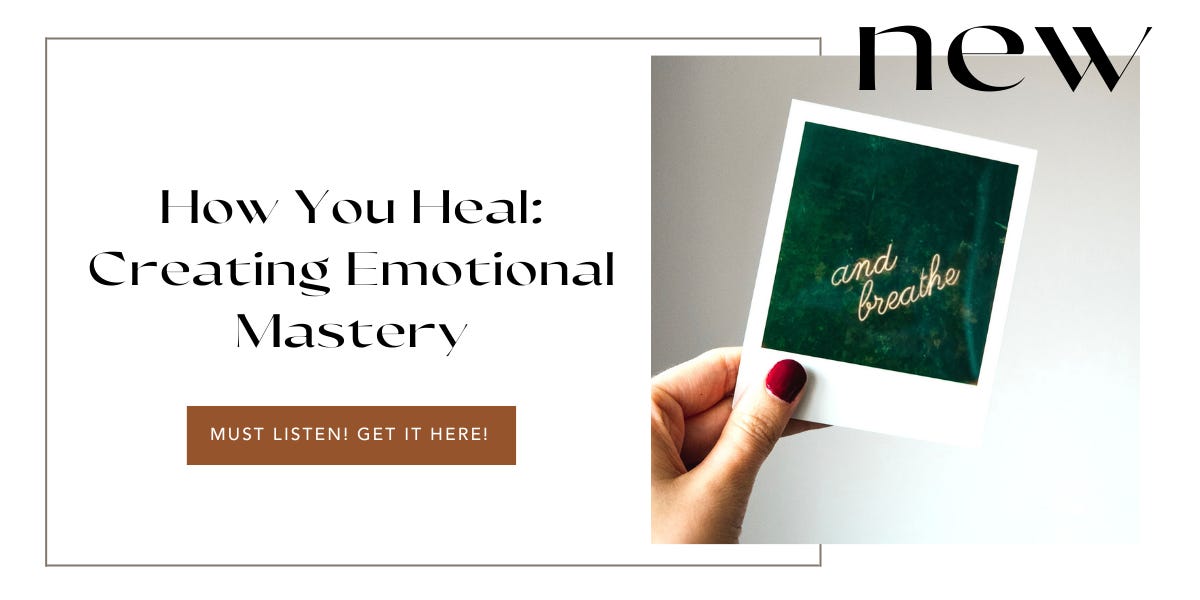It's Time To Feel Yourself Healthy
4 Minute Read | Did you know, you can feel yourself healthy? Learn tips to create emotional mastery by shifting your attention from what you hate to what you want.
Let me be honest for a moment.
I haven’t felt like the best person to write on emotional mastery. It feels hypocritical.
I know what some would consider emotional mastery is not a picture of my life. I feel big things and have many opinions about things, making those feelings even bigger.
To put it kindly, my emotions have gotten me into many situations I regret.
But here’s what I realized, mastery is not having things figured out 100% of the time. It’s not a mark of perfection. And it’s certainly not a feeling. Mastery is a metric of knowledge that brings the power to make changes or shifts.
It’s superiority over something that brings confidence to know when it’s working for or against you and then doing something to shift things in the right direction.
When you master your health, you have the knowledge and confidence that produces discipline to do what you know you should, even when you don’t feel like it.
Emotional mastery is the awareness of knowing what you’re feeling and how to act or what to think to feel differently.
More simply put, it's recognizing when your emotions are controlling you and doing something to regain balance.
Like realizing you’re sad before you hit the bottom of the chip bag.
Or realizing you don’t feel good about yourself before you stir up an argument with someone else.
Emotional mastery is learning how to control what you feel rather than being controlled by how you feel. And knowing this will change your entire biology.
This week on the podcast series, How You Heal, I dive into the biological connection to what you feel and why feelings are stored in the body until they're felt.
It follows the previous podcast on the human energy field.
Your weekly fill reminder:
Every emotion produces a physical reaction inside your body.
Like any other sense, your emotions are simply taking in information. The information your feelings portray is how your body will respond biologically, emotionally, and physically.
Changing the perspective of how you interpret the emotion changes your entire biology. Meaning you can 'feel' yourself healthy or unhealthy.
Understanding how to feel yourself starts with knowing that emotions are not the same as feelings. In this post, I share the following:
Emotions are short-lived, intense, and uncontrolled responses to specific stimuli. They are sensations inside the body based on specific experiences. Generally speaking, humans have the same fundamental emotional experiences.
Feelings are long-lasting and somewhat controlled because personal experiences and thoughts shape them. Technically, they are a perception of how we interpret emotions generated from our thoughts about the emotion experienced.
Emotions come first, and feelings come after.
You can't always control the emotion you experience, but you can control your feelings by shifting your perspective.
One of the best ways to create a new perspective is to sit in what you feel. The fear of the emotion is always worse than the emotion itself. The more you sit in your emotions, the less power they hold.
This week, stop avoiding what you feel and feel it.
Disclaimer: This will feel highly uncomfortable. As I listed in the steps of emotional mastery, number one is deciding you want to do it. Get all the steps here.
Your Weekly Action:
Stop giving the negative more attention than it deserves.
That doesn't mean you pretend like the negative doesn't exist. It does. But that doesn't mean it should be the controlling force in your life. And far too often, it is, even when you don't think it is.
There are two scenarios:
You openly admit (dare I say thrive) from the negative. Even wearing it like a badge of honor. You're the magnet of bad luck.
You've shoved the real negative down so deep that you pretend it doesn't exist, but it comes out in other negative ways. You tend to focus on other people's problems, blame-shift, or justify your own negative, creating an artificially positive exterior.
In either situation, the negative carries the attention, forcing your biology to respond accordingly. Both situations prove why the majority of people live stuck in survival mode. Because your body never has the opportunity to feel safe, and with safety comes healing.
A simple step is to shift your attention from the negative to the positive.
Stop giving so much attention to:
The number on the scale
How much food you did or didn't eat
Someone else's reaction or perspective of you
Worrying about your to-do list
The temptation you gave into
Your anxiety
What you didn't get done
The negative thoughts about your body
What you don't have
The future
Your past
I'm not saying ignore them. Like all emotions, they need to be acknowledged. But acknowledging and accepting are completely different things. You can acknowledge you have a weight problem without accepting it as truth.
Accepting makes it your reality, keeping you stuck in your problems. Acknowledging allows you to understand what areas you can change.
Things you should focus more on:
What God said about you
The feeling you had after finishing that workout
How energized you felt after the healthy workout
The present
Getting creative
Asking questions and living curiously
Complimenting someone else
Taking deep breathes
Smiling more
Creating space in your life and mind
Going at your own pace
Self-discovery
It's all a feeling, even if it is an action that produces the feeling. But it's what feeling you focus on that creates more of that feeling.
Stop letting life choose your feelings and learn how to create them.
I have more coming your way next week, especially for those emotions that seem so heavy you don't know how to free yourself of them.
Take a breath.
Smile.
You're closer than you know!





